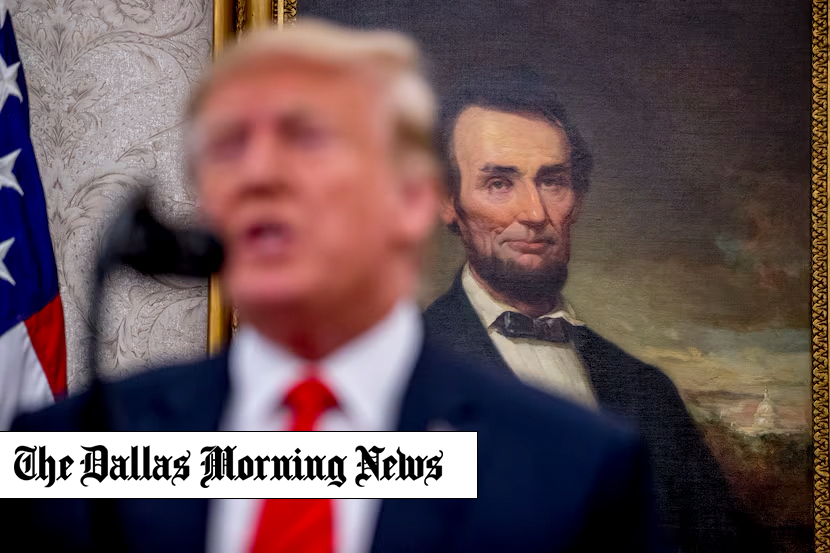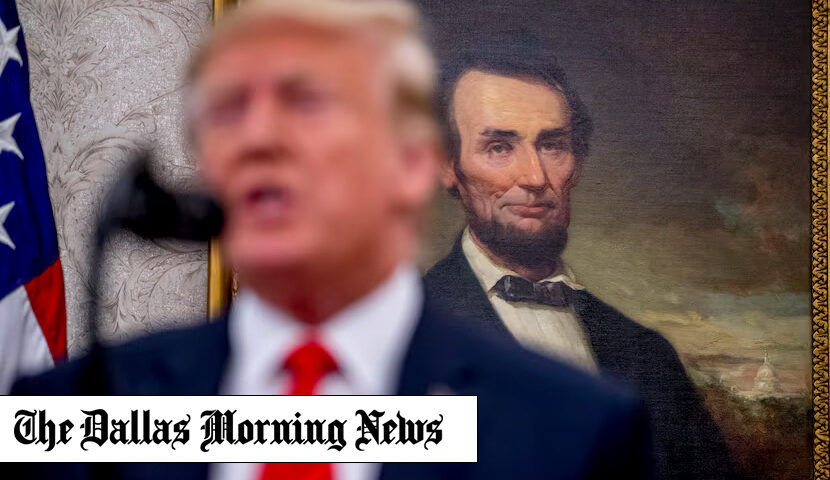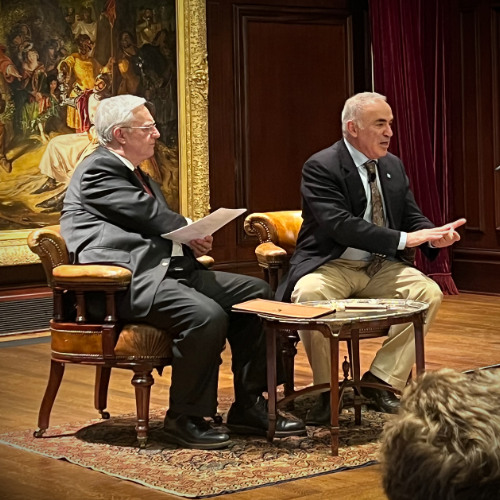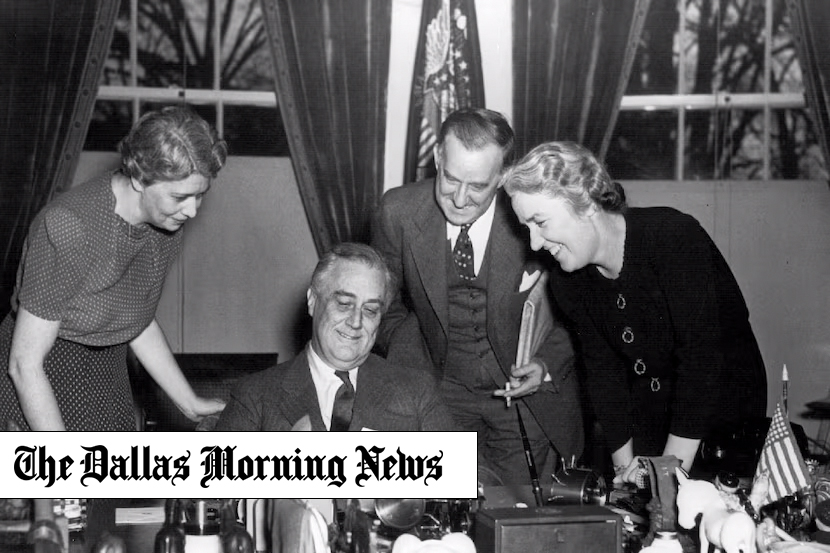
A painting of President Abraham Lincoln is seen behind President Donald Trump as he speaks in the Oval Office of the White House in Washington, Sept. 30, 2019. (AP Photo/Andrew Harnik, File)(Andrew Harnik / AP)
A Presidents Day wish
What if Trump followed the example of our best presidents?
Since 1971, when the Uniform Monday Holiday Act became law, the third Monday in February has been a national holiday, Presidents Day, which falls neatly between the birthdays of our two greatest presidents — Abraham Lincoln’s on Feb. 12 and George Washington’s on Feb. 22. It’s intended to be a day to remember the historic contributions of all presidents, though George and Abe usually get most of the attention.
Today, this scrivener would like to highlight the most important leadership traits of the two big guys, Washington and Lincoln, that would be worthy of emulation by President Donald Trump in the event he decides that his second term should be inspired by the lessons of history.
Washington’s integrity and commitment to unity
Washington’s integrity and commitment to unity
America’s first president knew his actions would set precedents for decades, and maybe even centuries to come. What exactly was the role of the president of the United States in this new checks-and-balances form of republican government, with separate powers given to the executive, legislative and judicial branches?
Although Article II, Section 2 of the new Constitution provided that “The President shall be Commander in Chief of the Army and Navy of the United States, and of the Militia of the several States,” with no wars looming on the horizon after our victory over England in the American Revolution, Big George (a giant in his era at 6 feet 2) believed that, as the country’s most powerful person, he should also serve as America’s Conscience in Chief and Unifier in Chief.
Washington thought our government’s top leader should be a man of unimpeachable integrity, meaning Americans could take whatever he said to heart without needing a fact checker, and would never be fearful that his policies were driven by ulterior motives. During his two terms from 1789 to 1797, there seems to have been no instance of Washington misrepresenting or overstating anything. His integrity allowed the new concept of presidential leadership to get off to a good start.
Knowing how governments throughout history had failed to survive because of divisive polarization, Washington saw the president’s role as maintaining unity and minimizing factionalism. In particular, he refused to take sides between the newly emerging political parties led by John Adams and Alexander Hamilton on one hand, and Thomas Jefferson and James Madison on the other.
Hamilton, the nation’s first secretary of the treasury, and Jefferson, the first secretary of state, argued constantly at Washington’s Cabinet meetings. To stay above the fray, and demonstrate his commitment to act as unifier, Washington refused to take sides and would shut down the verbal jousting by telling those involved to stop their bickering and submit to him detailed written position papers, which he promised to read and reflect upon privately before announcing his decision on the topics at issue.
The process worked. Both sides did what he told them to do and were satisfied with the soundness of his decisions.
Wouldn’t it enhance America’s political climate over the next four years if Donald Trump embraced George Washington’s unyielding commitment to integrity and national unity?
Lincoln’s magnanimity and equanimity
Upon being elected in November 1860, Abraham Lincoln (our tallest president at 6-4) knew he would have the toughest presidency since Washington’s. Prior to his being sworn in, seven Southern states had seceded from the Union with more likely to follow. Honest Abe knew “a house divided cannot stand,” and to fulfill his sworn duty to uphold the Constitution, he believed he had to do what it took to bring the departed states back into the fold and thereby reconstitute the United States of America.
From Day One of his presidency in March 1861, tension and friction kept ratcheting up. Lincoln’s “Team of Rivals” Cabinet started out his first term by criticizing and undermining him, as did Southerners, as did Union generals once the war commenced, as did his obstinate wife, Mary.
With so many people causing problems for him, Lincoln always took the high road. He never took the bait tossed at him by peddlers of outrage, and refused to be vindictive toward his adversaries. He managed to stay level-headed and even-tempered in public and most of the time in private, regardless of his stress level.
Lincoln confided to friends, “A man has not time to spend half his life in quarrels. If any man ceases to attack me, I never remember the past against him.”
In another instance he wrote, “I shall do nothing in malice. What I deal with is too vast for malicious dealings.”
And again, “I have never willingly planted a thorn in any man’s bosom.”
Wouldn’t it invoke a wonderful new era of civility that could potentially produce a more positive national spirit if Trump modeled Lincoln’s self-control and maintained a steady temperament toward his critics?
History will surely grade Trump’s presidential performance much higher if he decides to replicate Washington’s example as Conscience and Unifier in Chief, and maintain Lincoln’s steadfast commitment to taking the high road.
And there’s no better day for him to start applying these lessons from history than Presidents Day.
We welcome your thoughts in a letter to the editor. See the guidelines and submit your letter here. If you have problems with the form, you can submit via email at [email protected]




